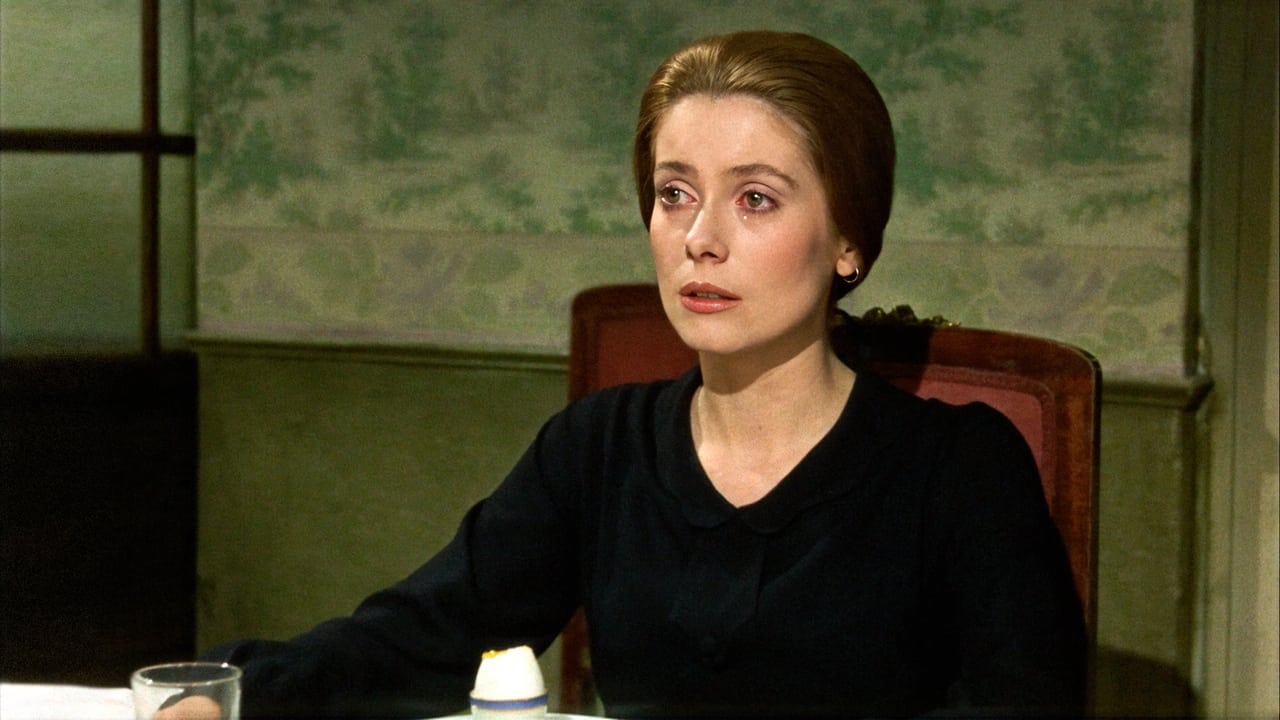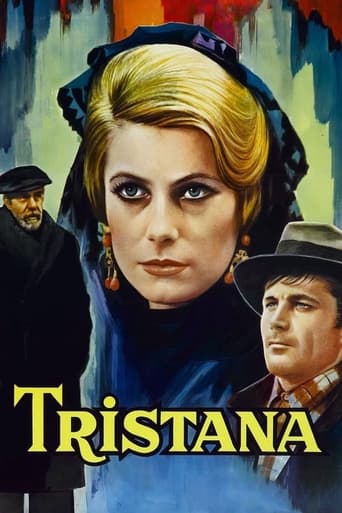



Such a frustrating disappointment
Slow pace in the most part of the movie.
Although it has its amusing moments, in eneral the plot does not convince.
View MoreI enjoyed watching this film and would recommend other to give it a try , (as I am) but this movie, although enjoyable to watch due to the better than average acting fails to add anything new to its storyline that is all too familiar to these types of movies.
View MoreIt is true that Spanish film 'Tristana' is considered an important work in the cinematographic career of Luis Buñuel. It has all the necessary ingredients to make it extremely appealing to viewers namely an excellent cast of versatile actors: Fernando Rey and Catherine Deneuve. For making it, Buñuel chose to adapt realist novelist Benito Perez Galdoz's eponymous novel. However, despite all these strong points, Tristana lacks the criticism and sharpness which one finds in most films made by Buñuel especially films in which he has made mockery of organized religion and its practices. Tristana does not succeed much as it appears as a plain drama. The sad thing is that criticism of Spanish nobility and its members' lifestyle is missing from this film. What viewers get to see are a series of dramatic situations which unroll in quick succession. This is one reason why even no commentary has been made about the role of freedom for Spanish women who wanted to get rid of dominating male influence in their lives. This is strange as it was something which Buñuel wanted to portray in his film.
View MoreI must have watched a different movie than the reviewers who call this "the top movie of all time" a 10 plus and so forth.First of all dubbing robs 90% of an actor's abilities and the two main characters are dubbed De Neuve and Fernando Rey..it sounds like a spaghetti western. Also the many times used theme of a Gigi like uncle who falls in love with his niece (charge in this case) is not shocking or particularly interesting. Zola used it in Dr. Pascal.As another reviewer states this is a novel turned into a movie so all the changes that occur in DeNeuve seem too abrupt as they try to pack 300 pages into an hour and half. Suddenly Tristana is a bitter woman....from an innocent girl. Also please if this is a world quality movie why did the director use that tired old technique of showing the hands only when Tristana is playing the piano. Also although very minor there were slip ups in the time editing...a modern car can be seen in the back ground of one of the scenes and the train lines were electrified.I am sure the movie can be micro-analyzed for symbolism and visual cues..on the door of the apartment they live in is the faint white scrawl of a man's face and so forth (death?).I am sure it is flawless in this way...but as far a convincing as to why DeNeuve turns jaded it just doesn't work well---the dubbing and the abruptness mainly...I did find the main character's hypocrisy good a socialist ordering glazed maroons and living the high life....although in a leftie directors eyes this may not have been intended to be hypocrisy but rather showing his sophistication. God knows that is quite possible.I did not quite understand the deaf young men's symbolism. Didn't find it worth speculating on.DO NOT RECOMMEND
View MoreTristana is a Buñuel's film based on Benito Perez Galdos' realist novel of the same title, what Spaniards call a "novela costumbrista", that is, an epoch novel that focus on real local customs, social types and atmosphere.It tells the story of Tristana, a 19y.o. orphan girl, who moves to the house of her legal guardian, Don Lope, a socialist bourgeois womanizer, who becomes not only her father, but also her lover-husband.The way Buñuel shot the movie is not especially daring or original within Spanish cinema, and, despite what some people say, there is not surrealism in this movie, just some oniric images - two very different things that people mix too often. What makes the movie so interesting is not the realist way in which depicts 19th Spanish society (there are many movies of this sort in Spanish cinema), but how Buñuel approaches and modifies the story to bring out Tristana's dark side. The movie ends exploring the boundaries and limits of the economical, social, and gender orders, and, more importantly, the boundaries between good and evil. The story also shows the hypocrisy of the bourgeoisie, that preaches Socialist ideas and criticize wealth and the social order, despite them being wealthy, being part of that system and direct beneficiaries of the order they criticize.In fact, in Tristana nothing is what it looks like, everything has two sides, there is not good and evil, but good-and-evil. The viewer starts despising and hating that indecent abuser of Don Lope, for his social hypocrisy and his sexual behavior, forgetting that young Tristana, despite despising him, does not oppose or resist his sexual advances, and lives like a princess from his money being as hypocrite as her master. A little intermezzo contains her meeting, love story, and escape with young bohemian painter Horacio. The viewer feels that this should be the end of the movie, the poor girl rescued by pure love. Mistake! - The second part of the movie, shows Tristana's true nature. She is sick and misses Don Lope and his wealth, so she leaves her lover and returns to Don Lope's house, and even marries him; he becomes her carer and dutiful husband. If Don Lope is a monster and treated her so badly why would she want to return to his place? She has soaked in all the preaching of his father-husband and uses them against him; she becomes the tyrant, the intolerant, the abuser, and the one that takes advantage of the old tamed Don Lope, who changes his behavior and customs to suit Tristana's needs and whims. Tristana ends being Don Lope's mirror image in reverse, a product of his teachings, but also a more wicked human being only interested in money, power, and revenge. The viewer ends thinking that nothing is what it looked like, and that both Don Lope and Tristana are connected to the core, identical in a way, evil both of them.As always, Buñuel is a master at directing actors and creating an homogeneous ensemble of a group of big movie stars. Fernando Rey really nails his role, and offers a convincing range of emotions and behavior, from father to jealous father, from stallion to grandpa, from an open-minded intellectual to a petty tyrant, from funny guy to a jerk. Catherine Denueve is great in a role that suited her acting abilities, and her cold beauty is perfect for Tristana. Lola Gaos is great, as always, in her role of submissive hard-working servant, hard and sweet at the same time. The rest of the cast, which includes Franco Nero, Antonio Casas, and Jesus Fernandez, among many other supporting actors, are also good in their respective roles.Not the best or most experimental Buñuel's movie, but very intriguing, with terrific performances, that offers an accurate portrait of Spain in the 19th century and explores controversial philosophical themes.
View MoreI like all films by Buñuel, and I don't think any of his films are boring. Yet, even if they could be very remarkable, some films are much "cheaper", less perfect than others, maybe because they were on a more limited budget. Tristana, though, is one of the perfect ones, in terms well-made:ness. I haven't got much to complain about this film. There is only one piece of music, and obviously Buñuel didn't put much music in his films, but it's acceptable, perhaps a good thing. The acting is very good. Rey is very good. I find the most impressive things to be the script and the dialog, which are fantastic.Not the most surrealistic work, yet, probably one of Buñuel's ten most well-made.
View More